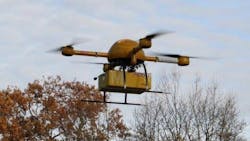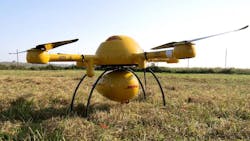Might drones replace trucks for package deliveries?
It is no secret that many think drones – or, to use their technical descriptive, unmanned aerial devices (UAVs) – prove an ideal delivery platform for small packages.
Indeed, there’s been significant testing of them lately for such service: DHL with its “parcelcopter” in 2014 and United Parcel Service with its parcel car-drone combination earlier this year offer up but two commercial examples.
Even the U.S. military – a longtime user of UAVs for reconnaissance and, let’s just say it bluntly, targeted assassinations – is now testing cargo-carrying drones for battlefield logistics operations.
The question, however, is whether the “idealness” of drones airlifting small shipments to destinations near and far means they might reduce the need for trucks in the package delivery market.
After listening to the testimony of Gary Shapiro, president and CEO of Consumer Technology Association (CTA), on Capitol Hill this week this “reduction” in demand for trucks due to drones seems a very real possibility.
During the House of Representatives Subcommittee on Digital Commerce and Consumer Protection hearing dubbed The Disrupter Series: Delivering to Consumers, he argued that drones can be “safely integrated” into the U.S. transportation system, thereby reducing traffic congestion, exhaust emissions, and overall fuel consumption.
“Americans receive about six billion package deliveries each year, each weighing an average of three pounds,” Shapiro emphasized. “If many of those packages were delivered by drones, it could improve delivery times and lower consumer costs.”
Reading between the lines, you can see how fewer trucks would be needed if drones start airlifting a goodly slice of those six billion packages.
Indeed, CTA projects that there will be a total of one million drone flights per day in the U.S. at some point in the next 20 years. “We can also expect drone usage to create more than 100,000 jobs in the next ten years,” Shapiro added.
While the Federal Aviation Administration (FAA) has proposed a regulatory framework regarding UAV operations, while also establishing a mapping system to indicate where UAV operation is authorized (though its attempt to force people to register recreational drones got shot down in court) CTA is trying to get a far broader and “clear ruling” at the federal level for much wider and freer use of those devices.
“The myriad of misaligned and conflicting local rules currently emerging across the country threaten to throttle this nascent technology and all the benefits it could bring to American consumers,” Shapiro noted in his testimony. “We need our government to create a regulatory environment [that] allows for more operations at night and beyond line of sight [to] maximize the use of new technologies and support continued innovation in this space.”
Yet if a Canadian survey conducted by consulting firm Accenture is any guide, the desire on the part of everyday citizens for “clear rulings” on the part of national governments for UAV operations may be in the opposite direction of what CTA and freight transportation firms’ desire.
And, yes, while this is a survey of Canadians, it certainly seems Americans share many of the same sentiments when it comes to drones, though Canadians may not taking up arms to shoot them down.Four in 10 (or 40%) of the more than 1,003 Canadians surveyed as part of Accenture’s study said that drones equipped with video cameras should be a “key area” for government regulatory review.
Though Canada’s federal government recently announced new restrictions on where and when people can fly remote-controlled drones weighing more than 250 grams (or just under nine pounds) – mandating that they be marked with the owner's contact information – citizens apparently want more oversight, not less, of these aerial devices.
Accenture’s survey asked whether the government should step in and provide more regulation, step off and provide less regulation, or step away because the industry or product is evolving well without any more regulation, where certain technologies are concerned.
The top five technologies that Canadians cited most as requiring more regulatory review were drones and autonomous vehicles (each cited by 64% of respondents), followed by ride-sharing services (51%), quasi-currencies like Bitcoin (49%), and online user agreements (46%).
In many instances, Baby Boomers are more likely than younger Canadians to want the government to step in and provide more regulation around and drones, with 77% of Boomers desiring more rules versus 63% of Gen Xers and 47% of Millennials.
Something to think about as technology marches on in the transportation sector.

